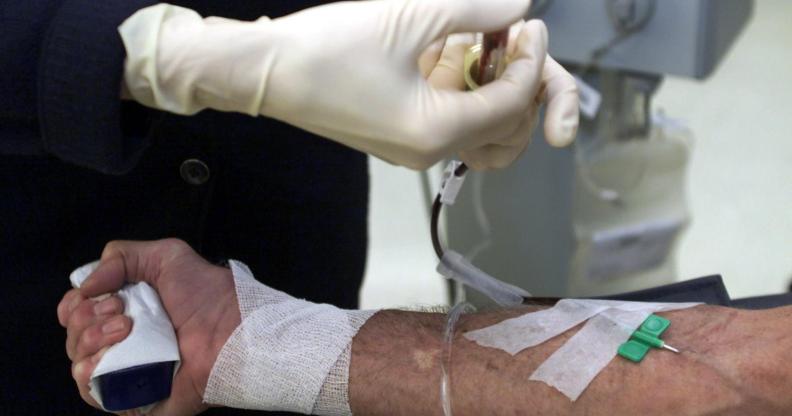Blood donation rules for gay and bisexual men finally relaxed in Australia – but it’s still not enough

A donor gives blood at the Red Cross blood donor bank, Sydney. (Getty/ Fairfax Media/ BRENDAN ESPOSITO)
Australia has relaxed its blood donation policy for gay and bisexual men, who are now allowed to donate after three months of celibacy.
Previously, rules stated that blood donation was only available to queer men and trans people who have sex with men in Australia after a full year of abstaining from sex.
The new rules, effective from 31 January, amend restrictions brought in during the AIDS crisis.
Nic Holas, co-founder of The Institute of Many, a grassroots movement for Australians living with HIV, told Radio Melbourne: “It’s really promising to see Therapeutic Goods Administration (TGA) and other organisations make decisions based on the actual science of HIV transmission, testing, and risk in 2021. Not the outdated fears of the 80s and 90s.”
He added: “There was no scientific reason whatsoever for a 12-month deferral, there was no scientific basis for it.”
But while many are celebrating the move, others are calling for the blood donation restrictions to be scrapped completely.
Rodney Croome, blood equality advocate for the LGBT+ rights group just.equal, told LADbible that a recent study published by the American Journal of Public Health showed that assessing the safety of individual donations was “equally effective in protecting the blood supply” as a blanket ban.
Croome said: “This landmark study confirms that reducing the celibacy period is tinkering at the edges.
“To remove discrimination and increase the supply of safe blood, Australia must adopt a new approach to blood donation that screens donors for their individual sexual risk rather than the gender of their sexual partner.
“The current governments of both the United States and the United Kingdom are committed to replacing their gay blood bans with individual risk assessment, and it’s time for Australia to do the same.
“We call on the Australian Red Cross Lifeblood Service to ditch a policy American experts label ‘illogical and unsubstantiated’, and adopt a policy based on scientific evidence instead.”

